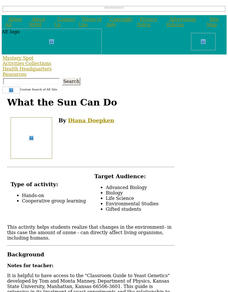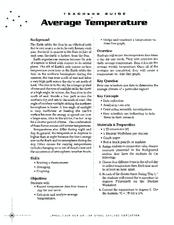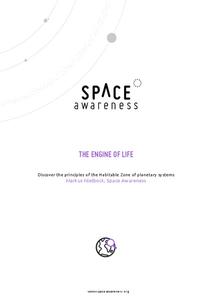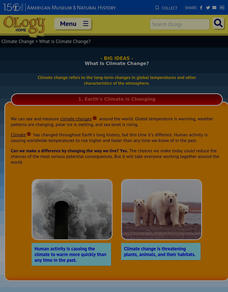Curated OER
The Earth's Rain Forests
Learners study the importance of the world's rain forests. In this rain forest instructional activity, students read about the role of the rain forests in the world's environment. Learners then write a formal letter to a member of...
Curated OER
What the Sun Can Do
Students develop and test a unique, personally-relevant hypothesis about the consequences of exposure to UV radiation based units on a living organism, common baker's yeast (Saccharomyces cerevisiae).
Curated OER
Average Temperature
Fourth graders study temperature. In this average temperature lesson students record temperature data, calculate and analyze average temperatures and construct a time line graph.
Curated OER
Earth Day/Nature Vocabulary
In this nature vocabulary worksheet, students identify nature vocabulary words by choosing the correct word for each picture. Students complete 18 problems.
Curated OER
Building and a sundial
Students create a sundial. In this sundial lesson plan, students examine the history and use of sundials. Students create a sundial and test their sundial.
Curated OER
Beyond The Earth Part I
Students explore the solar system. In this space science lesson plan, students take notes on the solar system provided by their instructors. Students then collaborate to design a computer-generated drawing of the solar system.
Curated OER
Sun and Temperatures
Students consider the relationship of temperature to environmental conditions and then apply their knowledge to a practical event. The task assesses students' knowledge and application of that knowledge to an additional situation.
Core Knowledge Foundation
A Time for All Seasons - Winter
As the days get shorter and a chill enters the air, it's time to start teaching your little ones about the wondrous winter season. Through a series of teacher demonstrations, whole-class read alouds and discussions, and hands-on...
Class Antics
Leap Year
What is a Leap Year and why do we have it? Find out with this Leap Day/Leap Year response to reading learning exercise in which scholars read a short passage and use their new-found knowledge to answer five questions with short...
Star Date
Solar System Scale Model Demonstration
Explore outer space and decorate your classroom with an astronomy project. Learners create a visual model with the creation of a scaled solar system using different sized balls.
Space Awareness
Oceans as a Heat Reservoir
Oceans absorb half of the carbon dioxide and 80 percent of the greenhouse gases released into the atmosphere. Scholars learn how and why the oceans store heat more effectively than land and how they help mitigate global warming. Pupils...
Core Knowledge Foundation
A Time for All Seasons - Spring
Celebrate the arrival of spring with this fun primary grade science unit. Engaging young scientists with a variety of hands-on activities and inquiry-based investigations, these lessons are a great way to teach children about...
American Museum of Natural History
Make a Terrarium
Scholars read a brief overview of what a terrarium is and how it creates the greenhouse effect, then click on a link to discover the materials and 10 steps they need to build their own.
Voyage Solar System
Round and Round We Go — Exploring Orbits in the Solar System
Math and science come together in this cross-curricular astronomy lesson plan on planetary motion. Starting off with a hands-on activity that engages the class in exploring the geometry of circles and ellipses, this lesson...
American Museum of Natural History
Journey to the Stars
Fifteen detailed pictures and informative captions delve deep into the exploration of stars—their life cycle and importance in the universe.
Community Consolidated Schools District 168
Solar System Model Project
Challenge young astronomers to demonstrate their knowledge of the solar system with this fun open-ended science project. Provided with a short list of requirements, students are given the freedom to use their creativity and whatever...
NOAA
Tides
Low tides, high tides, spring tides, neap tides, diurnal tides, semidiurnal tides, mixed tides ... just how many types of tides are there? The 10th installment of a 23-part NOAA Enrichment in Marine sciences and Oceanography (NEMO)...
Space Awareness
Britannia Rule the Waves
Could you determine longitude based on measuring time? Early explorers used a longitude clock to do just that. Scholars learn about early exploration and the importance of the invention of the clock. Then pupils build their own longitude...
Space Awareness
The Engine of Life
There is a specific zone, or distance from a star, that a planet must be in order to have water in a liquid form. The activity demonstrates how flux density depends on its distance from the source. A photovoltaic cell gets power to...
Curated OER
Water in the Biosphere
Environmental explorers examine the campus and take note of living organisms. Introduce them to the biosphere and the questions of the day: How much water can be found in the biosphere? A slide show helps you along, and even contains a...
Research Parent
Solar System Cards
Find all things solar system in a set of reference cards. Even Pluto makes an appearance! Each of the 24 cards has a picture and accompanying informational text that gives brief background about the object.
American Museum of Natural History
What Is Climate Change?
So many factors show that climate change has arrived. Learners read through an online resource that explains the data and the consequences of climate change. They also review strategies for slowing or even reversing the global influence.
Teach Engineering
Skin and the Effects of Ultraviolet Radiation
Though UV radiation can damage skin, it isn't all bad. The third installment in a six-part series allows the class to study the structure and function of skin. They learn about the different types of skin cancer and the SPF rating...
Columbus City Schools
Experiencing Eclipses
Don't be caught in the dark! Young scientists investigate the causes of both solar and lunar eclipses using an interactive to help them understand the development of an eclipse over time. They then research facts and characteristics...
Other popular searches
- Earth Moon Sun System
- Earth Sun and Moon
- Earth/sun/moon
- Earth and the Sun
- Earth, Sun and Moon
- Earth and Sun
- Earth Moon Sun
- Earth Rotation Around Sun
- Earth and Moon and Sun
- Earth Orbit the Sun























